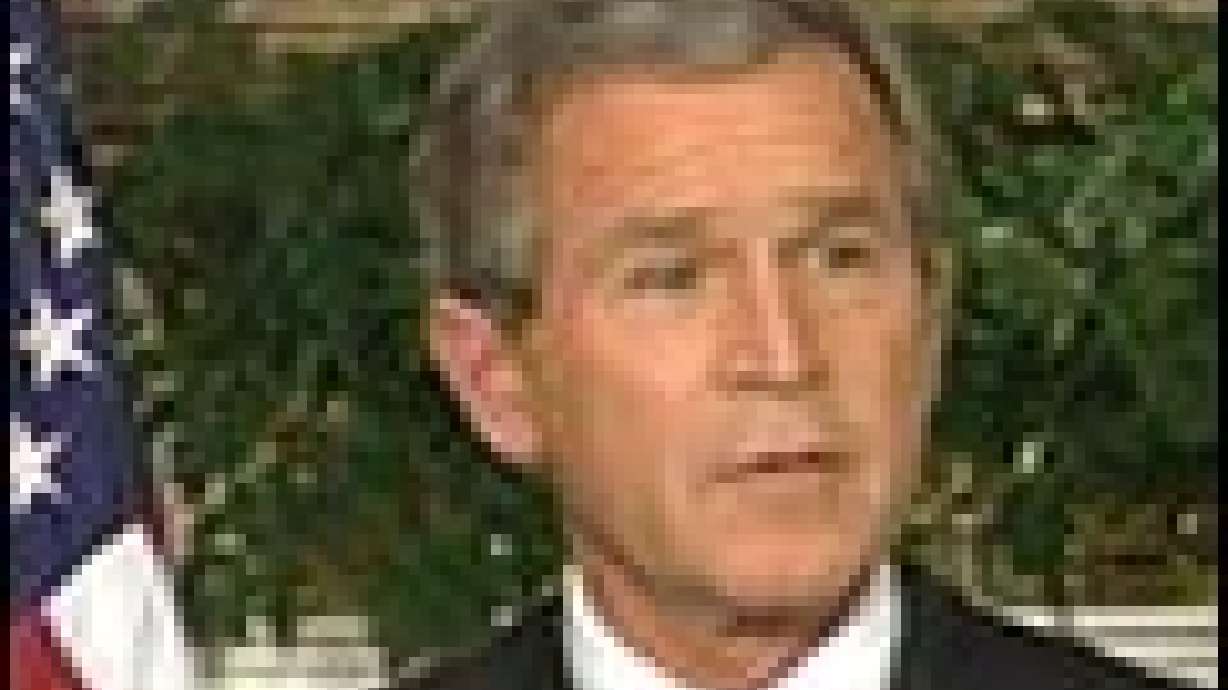Estimated read time: 4-5 minutes
This archived news story is available only for your personal, non-commercial use. Information in the story may be outdated or superseded by additional information. Reading or replaying the story in its archived form does not constitute a republication of the story.
WASHINGTON (AP) -- President Bush said the United States is slowly but surely dismantling al-Qaida despite a wave of attacks in Saudi Arabia, Morocco and Israel. He pledged to pursue Mideast peace but acknowledged it's "going to be a bumpy road."
Speaking hours after the latest suicide bombing in Israel, the president joined with Philippine President Gloria Macapagal Arroyo to recommit the United States and its allies to fighting terrorism across the globe.
"This is still a dangerous world we live in, and clearly the attack in Saudi Arabia means we have to be alert here at home," he said.
Arroyo, a staunch U.S. ally in the war on terror and in Iraqi reconstruction, was welcomed with the pomp of a state visit. It is only the third such visit of Bush's presidency, and the first by the head of state of an Asian nation.
At their East Room news conference, the president called Arroyo "a friend of America and a friend of freedom." He also named the Philippines a major "non-NATO ally," a designation that gives the country greater access to U.S. defense equipment and supplies.
Bush said there would soon be another deployment of U.S. forces to support Philippine-led anti-terrorism missions.
Arroyo said that while some nations feel hostile toward the United States, she believes that "U.S. leadership and engagement with the U.S. makes the world a safer place for all us to live in."
Bombings in Saudia Arabia, Morocco and Israel have raised questions about Bush's ability to stem global terrorism.
He spoke shortly after a Palestinian riding a bicycle blew himself up near a military jeep, in the fourth Hamas suicide bombing in two days.
"We're still on the road to peace,"' the president said. "It's just going to be a bumpy road. But I'm not going to get off the road until we achieve the vision."
The argument over how to rein in the militants and halt violence has been holding up implementation of Bush's plan to bring peace to the region. The so-called "road map" calls for parallel steps in the first stage, including a Palestinian crackdown on militants, an Israeli troop pullback from Palestinian towns and a construction freeze in Jewish settlements.
Israeli Prime Minister Ariel Sharon insists that the Palestinians make the first move. He was to have discussed his objections with Bush this week, but canceled his trip after Sunday's bus bombing. The Palestinians have accepted the plan as is.
Bush, who plans to visit the Philippines in the fall, was also feting the Philippine leader with a state dinner in the evening.
The president considers a formal state visit a high honor, and has bestowed it on only the leaders of two other countries: Mexico and Poland.
By contrast, former President Clinton was host to 27 state dinners during his eight years in office, former President Bush, 17 in four years.
The visit was seen as a payback for Arroyo's loyal support in the fight against international terrorism.
Arroyo was among the first world leaders to call Bush and express condolences after the Sept. 11, 2001, attacks. Arroyo and Prime Minister Goh Chok Tong of Singapore were the only two Southeast Asian leaders to support the U.S.-led war in Iraq, and she expelled three Iraqi diplomats after Bush asked allies to do it. The Philippines is sending a 175-member humanitarian mission to postwar Iraq.
The president and Arroyo have a few personal things in common. Both are 56. Arroyo is the daughter of a former president; Bush is the son of one. Both took office on the same day in 2001.
Arroyo wants to take home more than memories.
Singapore's Goh visited Washington last week and signed an agreement that would wipe out tariffs and other trade barriers on about $33 billion in annual trade and give U.S. banks and companies more access to one of Asia's main financial centers.
Now it's Arroyo's turn.
She is seeking duty-free privileges for Philippine products, such as dried mangoes, pineapple juice and tuna. Arroyo also wants to see Philippine businesses get reconstruction contracts in Iraq and is trying to lure U.S. companies to invest in operations on the islands.
The bombings this week in Morocco and Saudi Arabia, as well as intelligence reports that suggest the possibility of terror attacks in Southeast Asia, add to the urgency of Arroyo's request for more U.S. military aid for the only former American colony.
(Copyright 2003 by The Associated Press. All Rights Reserved.)








